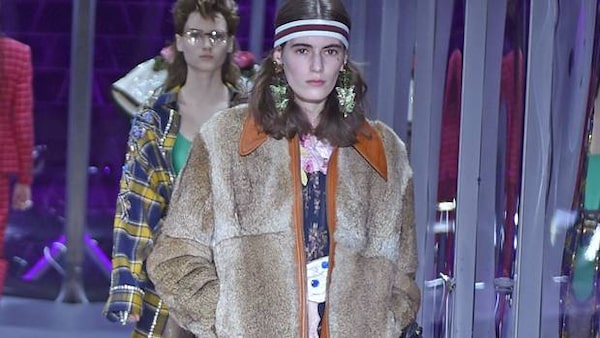
The step away from fur is a surprising move for a fashion house known for selling trendsetting kangaroo-lined slippers and mink coats in a robust fur market.
As the designer label joins the Fur-Free Alliance, Caitlin Agnew looks at how it will affect the perception and use of the contentious material
On October 11, Italian fashion house Gucci made international headlines when it announced that it would no longer use animal fur in any of its products, beginning with the Spring 2018 collection. Gucci follows in the footsteps of labels like Armani, Ralph Lauren and Calvin Klein, all of which have taken a stand against using fur in their collections, as well as luxury retailers Net-A-Porter and Selfridges, which no longer stock fur products.
The announcement was made as part of the 2017 Kering Award for Sustainable Fashion at The London College of Fashion, which is presented to LCF students by Gucci's parent company Kering. During a discussion with Livia Firth, founder of sustainability consultancy company Eco Age, brand president and CEO Marco Bizzarri said, "Gucci is excited to take this next step and hopes it will help inspire innovation and raise awareness, changing the luxury fashion industry for the better." Bizzarri added that the use of fur is not "modern," a key term for the brand (creative director Alessandro Michele has even appliquéd it in sequins onto a handbag).
The step away from fur is a surprising move for a fashion house known for selling trendsetting kangaroo-lined slippers and mink coats in a robust fur market (a 2017 study from the University of Copenhagen valued global retail fur sales at around $30-billion U.S.).
According to Alan Herscoviciof the Fur Council of Canada, unless Gucci is sourcing its fur from Canadian suppliers, this announcement will likely have no direct impact on the industry, which the International Fur Federation says contributes nearly $1-billion to the Canadian economy annually. Rather, Herscovici believes that Canadians should be proud of the country's well-regulated, responsible fur industry, and that Gucci's decision presents an opportunity for discussion about the practice of sustainability as it relates to materials used, the treatment of animals and over consumption.
"What is frankly quite strange about Gucci's statement is that they don't seem to understand that fur today is an extraordinary example of the sustainable use of a natural, renewable resource," he says. "Furs last quite a long time, they can be remodelled and restyled as fashions change and are ultimately biodegradable. This is what we want if we care about environmental sustainability. It seems to me that responsible, sustainable use of a renewable natural resource is pretty modern."
THIS WEEK'S STYLE HAPPENINGS
- Prada is coming back to Toronto’s Bloor Street West. On Oct. 14, the brand reopened a bigger boutique with a new look. Now occupying 1,000 square meters over two storeys, the space will house men’s wear, women’s wear, leather goods, accessories and footwear, as well as the men’s made-to-measure program, a service new to Toronto. For more information, visit www.prada.com.
- Vancouver’s Aritziahas partnered with American aviation apparel brand Alpha Industries on a new collection. Alpha Industries x TNA takes the brand’s MA-1 flight jacket, a classic bomber jacket, and translates it to an exclusive style with adjustable patchwork. For more information, visit www.aritzia.com.
- Alberta fashion and art organization PARK is gearing up for PARKForum, a two-day educational conference focused on teaching attendees how to grow and sustain their businesses in the creative industry. Taking place Nov. 4 and 5 in Calgary, the sessions includes art and fashion-specific topics, networking opportunities with industry and government professionals, as well as discussions of broader topics that are valuable to any business owner in the creative industry. For more information, visit www.ourparkonline.com.